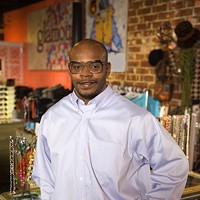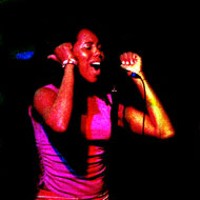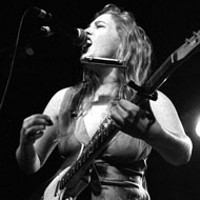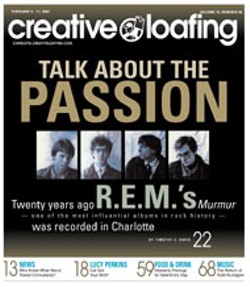Talk About The Passion
Twenty years ago, R.E.M.'s Murmur -- one of the most influential albums in rock history -- was recorded in Charlotte
By Tim C. DavisThose four guys? They called their band R.E.M. The album they were recording at the time? Their debut, Murmur.
Twenty years later, it stands as one of the seminal rock & roll albums of the last quarter-century, having inspired bands like Pavement, Nirvana, and the Smashing Pumpkins, to name but a few. At the time, however, it just seemed like a good idea.
Oh, and those dinosaurs? They still grace the band's amplifiers every time they record, and sometimes they even find their way onstage. They've been there since the very beginning, and tend to remind the band why they're doing what they're doing in the first place.Part One: Shaking Through
R.E.M.'s road to Charlotte was an interesting one. The band had formed a little less than three years before in Athens, Georgia, the product of a bunch of transplanted University of Georgia students with a taste for Patti Smith and the Velvet Underground. The band played their first show in an old church in Athens, their set consisting mostly of covers.
By January 1981, the band was playing Charlotte's now-legendary-but-then-dodgy Milestone Club, located off Freedom Drive. The band returned to the Milestone that March, but wouldn't return to the Charlotte area to play again until August of that year, when they played an event called "Charlotte's First Gay New Wave Disco and Costume Party" at Scorpio. Tickets were a reasonable $3, with proceeds going to benefit a variety of gay and lesbian charities.
That November, the band played Viceroy Park, a slightly larger club located in a strip mall on Tyvola Road. At their next Viceroy show in January 1982, the club had also booked a comic act called the Hit and Run Theatre Troupe, and insisted that the act go on between R.E.M. and the opener. Jefferson Holt, then newly minted as R.E.M.'s manager, supposedly told the manager at Viceroy Park that if the comedians went on between bands rather than before the bands, that R.E.M. would never play the club again. After collecting $680 for their efforts, the band kept their word, and wouldn't return to Charlotte until October 11, again at The Milestone. Opening that night was Peter Holsapple, the man who first introduced R.E.M to eventual Murmur producer Mitch Easter, according to R.E.M. bassist Mills.
That night, the band played six songs that would eventually appear on the album they were to begin recording in a few short months: "9-9," "Pilgrimage," "Moral Kiosk," "Catapult," "Radio Free Europe," and "We Walk." As was often the case with bands making their way through town, the band slept that night on mattresses at the Milestone, after being locked in by club owner Bill Flowers. If the band was looking ahead at this point, it was only because they wanted their own beds and a key.
Part Two:
Talk About The PassionR.E.M. began recording Murmur at Reflection Studios on January 6, 1983. Technically, this was the second trial session for the album. The song "Catapult" was recorded and mixed over the course of two days, and would eventually appear in the same form on Murmur. Recording proper began on January 20, when the band ran through "Radio Free Europe," "Laughing," "Talk About The Passion," "Moral Kiosk," and more. By this time, word of the quirky little band had spread around the studio, but both the musicians and the producers were too deeply ensconced in their work to notice.
Mike Mills, bassist, R.E.M.: "We actually got turned onto Mitch Easter by Peter Holsapple. We were familiar with him and the dB's, and we asked him for a good producer with sort of a nice sensibility -- (someone who was) talented, but wasn't going to try to force too much overproduction on us. I think given that it was not exactly a major label project but maybe something a little bigger than he was used to -- I only say this because I've heard him say this in interviews -- he wanted to have a little fallback, so he got (Don) Dixon to come in."
Mitch Easter, Murmur co-producer: "I remember the label was wary of the band working with an unknown, so we had to do a sort of "audition" session for IRS. This was the song "Pilgrimage.'"
Don Dixon, Murmur co-producer: "Mitch asked me to help out. I had consulted with him a bit on the R.E.M. EP Chronic Town, and he felt like my added experience with big-time record companies might come in handy -- at this point I had already made a few albums for major labels either as artist or producer. . ."
Mike Mills: "It was the beginning of trying to not be afraid of the studio, since we knew nothing about all the knobs and buttons and blinking lights. It was a very intimidating process, which is why we wanted Mitch -- we felt it was someone we could trust. So that was just the beginning of a very long, ongoing learning process."
Mitch Easter: "I had been to Reflection a number of times as a visitor, and had even tape-opped for Dixon a time or two. Dixon got involved because the label wanted 24 tracks! I had 16 at my place. . .I wasn't confident at that point about walking into a "real" studio like Reflection and doing a session, so I asked him to get involved. He worked at Reflection all the time, so everything was familiar to him."
Don Dixon: "I thought the band was among the most interesting of the 80s choppy-headed crowd. They came with guitars in hand and a very specific vibe, a specific sound. . .Mitch and I liked this band. We liked its quirkiness. We liked the songs they made up. We liked Michael's animal noises. We liked Bill's relentless drumming style. We liked Peter's arpeggiated guitar riffs, and we liked Mike's lead bass approach. We were very happy that we were able to preserve these unique qualities of the band. We were also glad that we were allowed to augment the overall record with interesting sounds and textures."
Mike Mills: "The record business then was not the way it is now. You could still put out a record and grow as a band both touring-wise and record-wise, and we knew that IRS gave us that opportunity, which is why we signed with them. However, given that, IRS did want hits -- they are a record company -- so they put pressure on Dixon and Easter to give it a more contemporary 80s sound, which is exactly what we didn't want. In fact, when we listened to the mixes of a couple of songs, I think "Moral Kiosk" and "Radio Free Europe," they were so discofied relative to what we wanted that Peter and I went up back up there and made Don remix them. (IRS Records') Jay Boberg had leaned so heavily on Don to give us this sound, and it was so stupid. . .The whole point is to avoid making something that sounded like it was made in the 80s. It was exactly what we didn't want, and that was the beginning of our odyssey with the record company, and, I suppose, the pressures between commercialism and art."
Mitch Easter: "(IRS wasn't pressuring us, but) they weren't thrilled with anything, either. There was a famous visit later on in the session where Jay Boberg gave Dixon this sort of toughie speech about producing a "hit,' which we all ignored."
Don Dixon: "Though IRS was skeptical about a bunch of hayseeds -- a hayseed mafia, more or less -- creating this record, they ultimately were very cool about letting us have at it. I believe that they just wanted to make a big splash at college radio -- their investment was minimal. You should take note that the band was sharing one motel room while recording this thing. . .and not even a very nice motel."
Mitch Easter: "The songs were pretty well there and mostly had been played onstage. Exceptions included "Talk About the Passion," which got sort of edited and cleaned up, arrangement-wise, and "Perfect Circle," which totally evolved into its recorded form while we were recording it. I don't remember who thought of doing "Perfect Circle" with the starting point being Bill and Mike playing two pianos at once, but the fact that Reflection had the "nice" piano along with the "saloon" one was essential to the direction that song took. Onstage, that song had been only vocal and a little Casio keyboard!"
Don Dixon: "I don't recall much writing going on in the studio. We'd go through songs and think about the structure. . .(however,) sometimes we wouldn't think about it much, and just push the record button. Lots of the intros were created after the fact and added during the mix. . ."
Mitch Easter: "(We'd) start about midday, go "til 1 or so, very informal, but fairly production-line. We mostly did basic tracks early on and overdubs later, except "Pilgrimage," which was recorded and mixed in one day and never touched again."
Mike Mills: (On whether the band visited the thrift store across the street to pass the time) "Oh yeah. Constantly! As a matter of fact, we have two plastic dinosaurs called Left and Right that always sit on our speakers when we make a record, and I believe they were purchased at that Salvation Army. It wasn't (a bad time in Charlotte). It wasn't bad because we were spending so much time working. There wasn't really any time for social life -- we were in there from 12 to 12 and I think the only real time we took off is when we all went out to see the movie Strange Invaders, which was our very first song in a movie. When the credits rolled and our names came up, we all stood up and applauded like crazy! The other three people in the theater were baffled."
Jamie Hoover, Spongetone, producer: "We were recording the Spongetones' "Torn Apart' at Reflection, and I remember going over from Studio C to Studio A, where the band was. I seem to remember gargoyles on the speakers. The whole place was decorated in sort of the typical Dixon/Easter fashion. I remember hearing them cover "Tighten Up' through the door and wondering what the hell they were doing."
Don Dixon: "The band always worked hard to find the common ground in a song. They each had a lot of autonomy in the creation of their own part, but they were aware of the whole in a way that some bands aren't. Nothing was sacred at that point, and they took a democratic approach to the process. Each member had a kind of veto power, and they used that power with great respect for each other. We had fun, if you can call making records fun -- there's an element of drudgery that is undeniable."
Mike Mills: "I guess we all know about Mitch beating on the chair for "Moral Kiosk.' There is a clanking metal sound in the break of one of the songs, which is Mitch pounding on the leg of a metal leg of a chair with a metal pipe. The main thing was that we were prepared to do anything at that point. "Perfect Circle' is actually two pianos being played at one time by myself and Bill (Berry). Of course, the noise at the beginning of "We Walk' is pool balls. It's Bill playing pool, recorded really fast and then slowed down. That's what makes that thunderous noise. There was a little breakroom down the stairs from the control room, and if you left the doors open you could hear the pool being played. So we sped the tape up, recorded the pool balls hitting, slowed it down and added a lot of reverb, and then turned it into thunder."
Mitch Easter: "We had fun. The only clash was over "production' -- due to the band's well-documented abortive session with Stephen Hague they had gotten sort of "safe.' We had to push them to relax a bit and do a few fancy "studio' touches here and there. This was understandable -- lots of silly sounding records were being made then!"
Mike Mills: "I don't think (we were trying to copy anybody). I think with some of the guitar stuff, and certainly some of the stuff that came out with the b-sides and oddities at that time, we were perhaps looking for a little Velvet Underground vibe, since we were doing some of their covers anyway, but no, there was nothing specific. I know Peter and I were fans of Big Star at that point, but I don't recall thinking about anything in particular as we were trying to make the record."
Part Three: CatapultR.E.M. wrapped up the recording of Murmur on February 23, 1983, and retired back to Athens for awhile to rest and prepare for a short tour with The English Beat. On April 12, 1983, Murmur was released. On October 6, the band played Late Night With David Letterman, and their ascension to modern rock royalty began. Twenty years and countless platinum albums later, some folks still look at the quirky little record churned out at Reflection as their best.
Don Dixon: "When you're so closely involved with something, it takes time to see past some of the things you've been trying to improve. I could stand to listen to it all the way through, (which is) high praise from me. I think it's still a very interesting record today. (It was) so different in its time, it has a timeless quality."
Anthony DeCurtis, contributing editor, Rolling Stone: "I was disappointed when I first heard recorded versions of some of the songs on Murmur on a tape that was given to me by Jefferson Holt, R.E.M.'s manager back then. I was living in Atlanta, just beginning to write about music, and was a huge fan of the band's, so I had already heard many of the songs in performance. To my ears, the versions on the tape paled in comparison. They sounded precious and enclosed -- the exact opposite of the exuberance and openness that excited me about R.E.M. Those versions differed somewhat from the ones that ended up on Murmur, but I felt the same way about the album the first time I heard it. Soon, though, I grew to love it. And, of course, Murmur's compelling evocation of a deeply internal space is precisely what makes it sound so rife with mystery to this day."
Peter Blackstock, editor, No Depression: "Freshman year of college, 1983. I'd found a ride from Fort Worth back to Austin for the Christmas holidays with a friend who tended to blast his car stereo alarmingly loud. Somewhere southbound on I-35, Rob slipped one of his new favorites into the tape deck, and out of the speakers wafted a most unusual music. It felt kind of eerie and spooky; lyrics hiding and seeking amid a melodic yet murky sonic riverbed. This wasn't like anything I'd heard on the rock radio stations that had informed my musical vocabulary to date. I wasn't really sure if I liked it, initially -- but it definitely made a memorable impression."
Bill Friskics-Warren, rock critic: "I think Murmur holds up very well, although today it perhaps sounds more like a folk-rock record than a post-punk record. I'm also surprised we don't hear it mentioned more as touchstone for alt-country bands. Certainly the more lyrical side of Uncle Tupelo's music derives from it, as, perhaps, do the rather oblique lyrics of the Jayhawks, circa Blue Earth. Those great Silos and Vulgar Boatmen records of the mid-to-late 80s? I can't imagine them without Murmur."
Anthony DeCurtis: "Years after the album came out, Michael would privately compliment me for pointing out in a review how Murmur is a kind of emotional travelogue ("a restless, nervous record full of false starts and images of movement, pilgrimage, transit"), something he hadn't realized until he read it. Years after that, I publicly returned that compliment to Steve Pond, the critic who actually wrote that apt description in Rolling Stone. I had been too flattered by Michael's kind words to correct him at the time.
Such misapprehensions, and small dishonesties, somehow seem part of what Murmur is about. It's a record whose songs come in and out of focus. Meanings are concealed, reveal themselves, then slip away again into the shadows. Right now, as I listen to it, Murmur sounds like a shimmering talisman from a more innocent, but no less dark, time, a souvenir, in Tom Verlaine's phrase, from a dream. Strangely, that's also what it sounded like 20 years ago."
Peter Blackstock: ". . .Soon enough, I found myself at the record store, plunking down a few dollars for my own vinyl copy of Murmur. It was the starting point for an entire new direction in my record collection. No longer would Tom Petty or the Police be the most adventurous things on my shelves. Soon there was Guadalcanal Diary, and 10,000 Maniacs, and Zeitgeist; gradually, the floodgates were unleashed. The 1980s became an era of discovery, of understanding what the word "alternative" could mean amid the arid landscape of popular music. The significance, of course, lies not in my own personal recollection, but in the fact that it was repeated dozens, hundreds, thousands, tens of thousands of times among my college-age contemporaries. The details may differ from person to person -- but I suspect the percentage of those stories that trace back to R.E.M.'s Murmur is remarkably high."
Jamie Hoover: "I was proud to have been around. They were such nice guys. It was strange to have seen them at The Milestone, and then, next time I saw them, they were playing the Walnut Creek Amphitheatre in Raleigh."
Mitch Easter: "You knew things in general were "happening' in those days and R.E.M. seemed happening, but beyond that we weren't thinking about it. I was pleased it was all turning out well, but in those days, thankfully, nobody was worrying about "hits' -- there was some residual attitude that "hits' = crassness! I had no idea whether people would dig it or not. I think the record stands up very well. Partly because we avoided paying any attention to the prevailing sonic fashions, and mostly because the band, as it turned out, were something special."
Mike Mills: "Why'd we record there? Well, Dixon had worked there, which was a plus. And I guess they mostly did -- and still do, basically -- 80 percent gospel. We liked that fact. Honestly? I think we really liked the fact that Tammy Faye Bakker had recorded there."
Speaking of News_.html, 5.00000
-
A Family Affair
Dec 12, 2007 -

Darrell Roach
Dec 12, 2007 -
Body Talk
Dec 12, 2007 - More »
Latest in Cover
More by Tim C. Davis
-

Bikers and Beerhounds
May 26, 2004 -

Farewell Fireworks
Jul 2, 2003 -

Drink It Up
Jun 25, 2003 - More »
Calendar
-

Queen Charlotte Fair @ Route 29 Pavilion
-

NEW WINDOW GALLERY-Pat Rhea-ACRYLIC PAINTINGS-April 05-30 2024 VALDESE, NC 28690 @ New Window Gallery/Play It Again Records
- Through April 30, 12 p.m.
-

TheDiscountCodes
-

"Blood Residue Analysis of Paleoamerican Stone Tools in the Carolinas" @ Native American Studies Center
- Fri., April 26, 12-1 p.m.
-

Brightfire Music and Arts Festival @ GreenLife Family Farms
-
Charlotte Pride and Trans and Queer People of Color Collective clash on Pride Week priorities 2
Disagreements over representation, policing in lead-up to Pride
-
Upgrade Labs Announces Expansion Plans in Charlotte Continuing Its Tremendous Growth
-
Restaurants struggle as restrictions remain and temperatures decline 15
North Carolina restaurants that pivoted to outdoor seating are finding new challenges as winter approaches.










